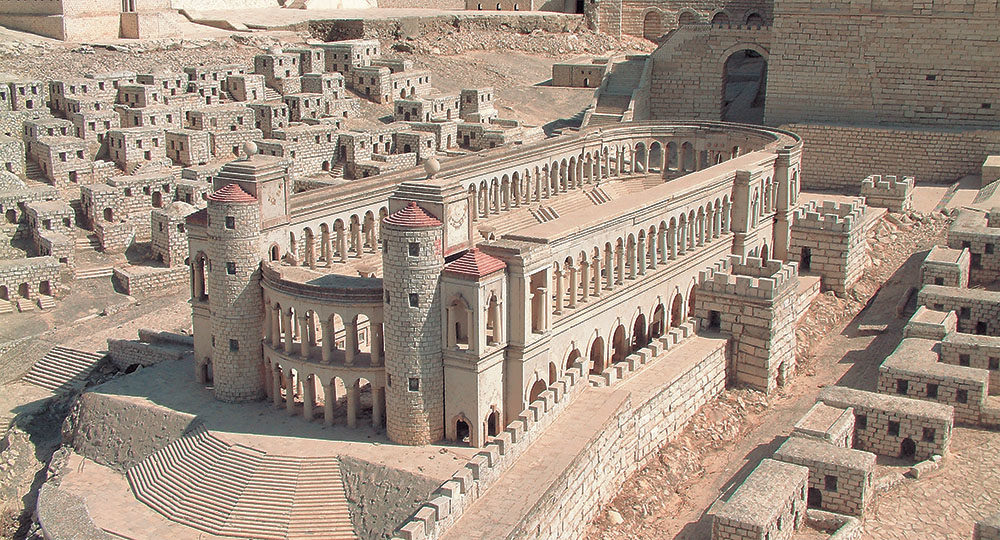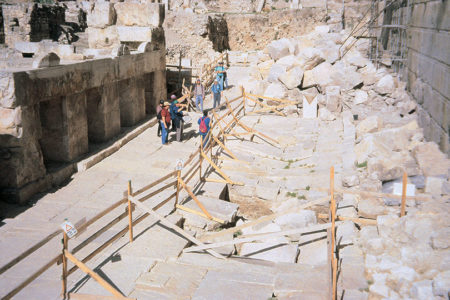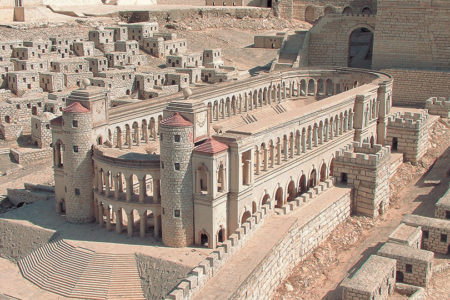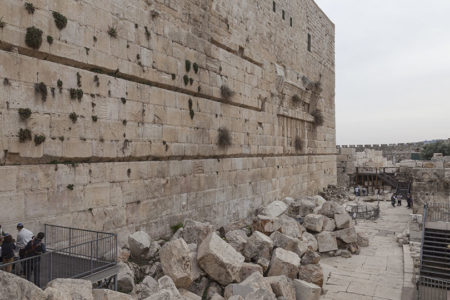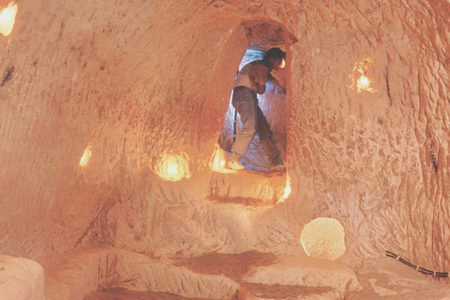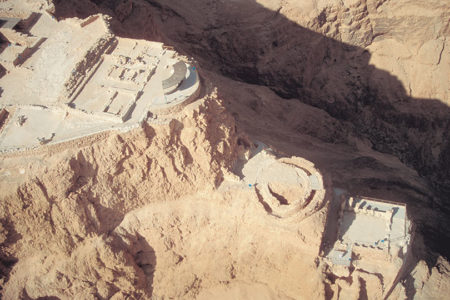Standing Firm for God
You are stealing bones!” shouted the black-clad, ultra-Orthodox demonstrators. Police guards were quickly posted by the tomb caves in Israel. Many stood around and wondered, Could these bones really be the remains of the Maccabees?
The Maccabean Revolt in the second century B.C. is a complicated period to understand. Yet the conflict illustrates important life lessons, such as faithfulness to God, perseverance in spiritual warfare, and the blessing of rededication to the Lord.
Deification of a Madman
After Alexander the Great died in 323 B.C., his empire was broken up among his four generals. Of those, two dominant powers soon emerged: the Ptolemies in the South, who ruled in Egypt; and the Seleucids in the North, who ruled from Syria and Persia.
Naturally, Israel could not escape becoming embroiled in their power struggle as both fought for control of the Jewish nation. At first Israel was ruled by the southern empire. During this period King Philadelphus of Egypt (285–246 B.C.) ordered that the first five books of the Old Testament be translated from Hebrew into Greek. Later the rest of the Scriptures were translated to produce the Bible version known as the Septuagint, meaning “seventy” in Latin. An outstanding result of this translation was that it introduced Greeks in the South to the true God and His Word. Consequently, many actually embraced the Hebrew faith.
The northern kingdom was different. It chose to practice and push a philosophy started by Alexander the Great called Hellenism. Hellenism was a conformity or devotion to the culture, religion, and language of ancient Greece. In 198 B.C., the district of Judea, referred to then as the “nation of the Jews,” was unfortunately taken over by the Seleucids of the North. And thirty years later, a madman came on the scene.
Antiochus the IV snatched the northern throne in 175 B.C. He was twisted and bizarre. According to the Greek historian Polybius, one of Antiochus’s morbid enjoyments was to pour myrrh over the floor of the public bathhouses, hide, and watch people fall. The pleasure was all the more enjoyable if the injuries were severe.
His grandiose ambition was to conquer Egypt and enlarge his empire. Since the province of Judea bordered Egypt, it was essential for Antiochus to have a loyal, Hellenized population as a buffer zone. So his first order of business was to subdue the region militarily and demand that all his subjects conform to Hellenistic ideals. He crushed all resistance.
Not surprisingly, he viewed himself as the true depiction and principal proselytizer of the Greek culture. To intensify his “modest disposition,” he gave himself the surname Epiphanes, which meant “the visible god.” Thus he became Antiochus Epiphanes, his version of the embodiment of the chief Greek god, Zeus.
The notion of a mortal declaring himself god offended some in Israel. The Hebrew Scriptures teach that God created man from the dust of the ground (Gen. 2:7). Though created in the image and likeness of God (Gen.1:27), man can never be God. One sure disqualifier is the inherit sin nature that permeates every human being (Gen 3:1–6; Rom. 5:12–14).
However, in the Hellenistic culture, such a misguided presumption was a natural conclusion. Perfection could be achieved by human effort. The emphasis was on the external, not the inner, man. Whereas the Bible stresses “the beauty of holiness” (Ps. 29:2), the Greeks stressed the holiness of beauty. With help from Greek art, literature, and mythology, it eventually became easy for mortals with this religious belief to think of themselves in terms of deity.
The king’s nickname Epiphanes spelled trouble for Judea. The Jewish people, having a more realistic assessment of Antiochus’s character, made a pun on the word, calling him Epimanes, meaning “Madman!”
Desecration of the Faith
Antiochus launched his second campaign against Egypt in 168 B.C. What he didn’t know this time around was that Egypt had become a Roman protectorate. Frustrated, he either had to break off his attack or face the wrath of mighty Rome. Infuriated, he marched north—and the Jewish people became the target of his rage.
Jerusalem was in trouble spiritually. Many Jewish people had embraced Hellenistic culture. A high priest, appointed by Antiochus, was aggressively challenging the ancestral faith with trendy Greek beliefs. A year before, anti-Jewish measures were decreed. These included mandatory worship of Antiochus as Zeus, a prohibition on circumcision, and the institution of ritual prostitution in the Temple.
But the big allurement to tempt the people from their faith was the pagan gymnasium built near the Temple Mount. Priests soon abandoned their studies for entertainment at the arena. Since wrestling in the nude was popular, Jewish youths found clever ways to disguise their circumcisions so they could participate.
It was a shameful act of accommodation. However, God always has His faithful remnant. A popular movement arose among the people who scorned Antiochus. They viewed themselves as Hasidim, Hebrew for “the pious.” They resisted the desecration of the faith. Consequently, many were seized, scourged, and slain.
Dedication of the Temple
Things were bad in Jerusalem. All the decrees issued in 169 B.C. went into effect by 167 B.C. Antiochus sent an emissary there with a huge army. It plundered the city and took women and children captive. Most of the sacred scrolls were torn and burned. Death came to all who kept the Sabbath and feast days. An idol of Zeus was placed over the Great Altar in the Temple. If that weren’t enough, the priests were ordered to sacrifice pigs on the altar. This particular desecration occurred on the twenty-fifth of the Hebrew month Kislev (November/December).
Enough was enough. A full-scale rebellion soon took place. The showdown occurred on a hill along the road from Jerusalem to Jaffa in a village called Modiin. A detachment of soldiers arrived to compel residents to sacrifice a pig to the pagan gods. In the crowd was an elderly priest named Mattathias, along with his sons. According to the apocryphal book of 1 Maccabees, considered a good historical, although extrabiblical, source, the officer came up to Mattathias and said,
Thou art a ruler, and an honourable and great man in this city, and strengthened with sons and brethren: Now therefore come thou first, and fulfil the king’s commandment, like as all the heathen have done, yea, and the men of Juda also, and such as remain at Jerusalem: so shalt thou and thy house be in the number of the king’s friends, and thou and thy children shall be honoured with silver and gold, and many rewards (2:17–18).
Mattathias, offended by this wicked intrusion, responded,
Though all the nations that are under the king’s dominion obey him, and fall away every one from the religion of their fathers, and give consent to his commandments: Yet will I and my sons and my brethren walk in the covenant of our fathers. God forbid that we should forsake the law and the ordinances. We will not hearken to the king’s words, to go from our religion, either on the right hand, or the left (2:19–22).
Bold words! Mattathias expressed what many faithful to God felt. Nevertheless, a frightened Jewish man stepped out of the crowd and went up to the altar to sacrifice the pig:
When Mattathias saw, he was inflamed with zeal, and his reins trembled, neither could he forbear to shew his anger according to judgment: wherefore he ran, and slew him [the man] upon the altar. Also the king’s commissioner, who compelled men to sacrifice, he killed at that time, and the altar he pulled down. Thus dealt he zealously for the law of God, like as Phinees [Phinehas, Num. 25:7–14] did unto Zambri [Zimri] the son of Salom [Salu]. And Mattathias cried throughout the city with a loud voice, saying, Whosoever is zealous of the law, and maintaineth the covenant, let him follow me. So he and his sons fled into the mountains, and left all that ever they had in the city (2:24-28).
A powerful, guerrilla-warfare army, which included the Hasidim, was organized. When Mattathias died, his son Judah took over. Under his leadership the revolt expanded from seeking religious freedom to a fight for full political independence. Judah soon acquired the surname Maccabee, which some say meant “hammer.” It reflected his tactics of quick, hammer-like attacks on his enemies.
Finally Jerusalem and the Temple were liberated. The city was a terrible sight. The gates were burned, the sanctuary desolated, and the Temple altar polluted. Falling on the ground and casting ashes on their heads, the victors wailed. Faithful priests were chosen to cleanse the Temple. They removed the defiled altar stones and built a new altar (4:36–43).
The new altar was dedicated on the same month and day it had been desecrated, the twenty-fifth of Kislev. The celebration lasted eight days. All the people worshiped and praised God, sang songs, and rejoiced with harps and cymbals. The Jewish holiday Hanukkah, which means “dedication,” still commemorates the victory today.
The war continued until it was won. But what was gained was soon lost. A new world power arrived to replace the Greeks: Rome. Yet for a brief moment in their bitter history, the Jewish people again experienced freedom. It has been said that the Maccabean Period was the last era of Jewish independence in the land of Israel until the modern State of Israel was born in 1948.
Several practical life lessons can be learned from this ancient conflict. First, just as Mattathias and his sons showed courage before Antiochus despite the king’s evil ways, so faithfulness to God brings fearlessness in the face of cruel men (cf. Prov. 21:30–31). The world will always contain men who challenge His ways. But the Bible admonishes believers to stand firm and honor God; and He will bring the victory.
Second, through Antiochus, Satan sought to destroy the Jewish people and undermine God’s program for the ages, namely, the coming of Jesus the Savior. Satan continues to seek ways to subvert God’s purposes by instigating hatred for Israel and all who love Christ. But our spiritual warfare is waged “not by might, nor by power, but by my Spirit, saith the LORD of Hosts” (Zech. 4:6).
Just as the small band of Maccabees came against the great Seleucid army, spiritual conflict is sometimes a fight between unequal forces. Unless we trust Jesus, the “author and finisher of our faith” (Heb.12:2), we cannot stand against the opposition, whether great or small.
Finally, the Temple was defiled; but it was again cleansed. So, too, the temple of our bodies can be defiled. But by confession (1 Jn. 1:9) and renewal (Rom. 12:1–2; 1 Cor. 6:19–20) we can rededicate ourselves to God and His service.
The commotion raised by the religious demonstrators at the dig site did not last long. No Maccabean bones were stolen, or found, for that matter. The hoopla was a publicity hoax. However, the valiant Maccabean Revolt happened indeed; and it still provides inspiration for faithfulness and trust in God.
